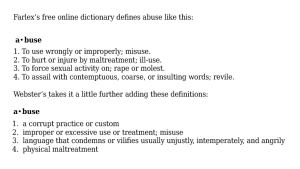
I’m not entirely sure why I haven’t written this post yet– of all the things I should be writing about, this is probably one of the more important. Every so often I get an e-mail along the lines of “I think my son/friend/sister might be in an abusive relationship– what can I do?” and I always take the time to answer these individually, and will continue to do so. However, over time, I’ve realized that there’s a few things I say to pretty much everyone, so I figured I should collect them into a post.
~~~~~~~~~~
Before we get started, there’s a couple terms I need to clarify: abusive behavior, abusive relationships, and abusers.
Someone who is not an abuser can engage in abusive behaviors. Human beings are quite capable of hurting each other, sometimes very deeply and consistently. Our relationships can be unhealthy and co-dependent, and can have various features that are abusive. Those relationships can sometimes be healed, and sometimes they need to be ended. However, there is a difference between someone who does abusive things and an abuser.
An abuser is what American culture tends to think of as a “sociopath,” although it is extremely important to point out that not all sociopaths and psychopaths are abusers. Sociopaths and psychopaths are mentally ill people, and with good and effective treatment can live productive, rich lives, filled with healthy relationships.
An abuser, on the other hand, lacks empathy, a moral conscience, and is driven completely and totally by their own-self interests and in protecting their self-image. They will go to any length to get what they want, and they do not care who they hurt. They are primarily interested in maintaining control in their life and over the lives of their victims.
~~~~~~~~~~
One of the most important (and most complicated) questions should be talked about right up front: should you report it to the police?
The answer: “it depends.” The important thing to keep in mind, however, is that it is extremely difficult for police investigations to move forward without the cooperation of the victim– if the victim denies it, which they are quite likely to, then the investigation will probably stop there, and the victim will face punishment from their abuser for telling anyone “exaggerations” or “lies.” If the victim has confided in you about their abuse but are unwilling to report it themselves, then you need to be extremely careful about what you do with that information. Chances are you could endanger the victim even further. If you break their trust, then they are also unlikely to trust you in the future, when they might be more willing to go to the police with you.
If they confide in you that they are being abused– and they recognize it as abuse– then you should encourage them to make a report. Make sure they know that they have your support– that you will go with them, that you will be there, that you will defend them. That you will not leave them no matter what. That you have their back.
Do not say things like “if you don’t report this, then s/he could go on to do this to someone else. This is your duty.” It is not their responsibility to report their own abuse. Yes, the police can rarely ever do anything without them. However, their only “responsibility” is to themselves. They could quite literally die if they report it, and quite often they are the only defense between their abuser and other people, such as their children.
Individual circumstances might be different, however. If you believe that the victim’s life is in serious and immediate danger, then that changes things dramatically and you should probably notify the police. If the abuse has escalated to that point, then it is possible that a police investigation could be successfully conducted.
Again, all of this depends. Every situation is different.
~~~~~~~~

One of the first things I encourage people to do is “be a safe place.”
People, in general, don’t enjoy having their choices criticized, and while remaining in an abusive relationship isn’t actually a “choice” since their autonomy has been suppressed by their abuser, they tend to think of their relationship in those terms. If you criticize their choices, then they could respond defensively, and the only thing you’ve accomplished is entrenching them even further into their relationship. You will become someone who just “doesn’t see him/her the way I do” or who “doesn’t understand what is really happening.” Frequently, victims see themselves as being necessary to their abuser’s well-being. They are helping their abuser to get better. They’re not blind to the problems– they just see those problems in different terms.
Victims need to know that you love them. That you accept them. That you are trustworthy. That you take the time to understand. Sometimes, they might even approach you with “haha, my partner did this the other day, isn’t that crazy! They’re so funny!” They want someone to confide in, but they want to do it on their terms.
Listen. Be perceptive and alert. Ask leading questions, and see if they might be willing to give you details. Ask things like:
Have they done something like this before?
How does it make you feel when they do something like that?
Try to see if they can be honest about what their relationship is like and what the problems are. Establish patterns– that it’s not a one-off, that what they’re doing fits into things they’ve done before. It’s important to avoid the “every relationship has problems” pitfall, however. Yes, relationships take work, but there is a difference between two people working on figuring out their communication problems and abuse. Do they think that this would ever be “normal” in a healthy relationship? Contrast what they might be rationalizing as “problems that need work” with what are actual real-life problems that need work.
In an abusive relationship, a problem is “I must never, ever go to this person’s house ever again because they would not like it.” In a healthy relationship, a problem is “I should probably talk to my partner about why they don’t like it when I spend time with that person, and I have the ability to make up my own mind and form a compromise, if I want to. They trust me.”
~~~~~~~~~~
As a part of removing a victim’s agency and autonomy, abusers will do everything they can to remove any sense of self-worth, value, and confidence. They might make the victim feel as if they are illogical, as if their own thought processes cannot be trusted. That they are stupid. Ugly. That no one else will ever want them.
You must do the opposite. Let them know that they are a smart, funny, capable, competent, wonderful, valuable person. That you value your relationship with them, that their presence in your life means something to you. That you like them. That you believe in them. That you have hope for their future. That they are fine just they way they are, that they do not need to be “fixed” by their abuser’s “reforms.” Give them something to believe in besides what their abuser is telling them.
~~~~~~~~~~
Be watchful. Pay attention. Abusers can be extremely talented manipulators. They can be charming, friendly, and popular. They can seem extremely well put-together; fashion conscious, meticulous, educated, articulate. They can be someone you’ve known for a very long time. They can be a respected figure in your community, a self-giving public servant.
They can be anyone.
They are usually the person you would never suspect.
They don’t usually have beer-bellies and stubble. They don’t keep a baseball bat near-at-hand. They don’t have to be alcoholics. They’re rarely obviously stupid. They don’t have to be overtly aggressive and domineering, yelling and slapping people around.
It’s not at all unusual for you to second-guess your instincts about a person or a relationship. No one wants to believe that someone we know could be hurting someone else we care about, and we can go a long way in rationalizing behavior we see. Oh, they just had an off day. They’re stressed. It’ll pass.
What an abusive relationship looks like in public can be very difficult to spot, especially if you didn’t know the other person before the relationship began. There can be signs, however– things like does s/he stop a sentence in the middle after their partner/parent gives them a significant look? Does s/he acquiesce to everything the other person wants immediately, even when it’s obvious that’s not what they want, and they don’t resist? If they disagree, is one of them consistently “winning” with hardly any input from the other? Do they try to anticipate what their partner/parent wants and seem stressed if they don’t know how to figure out what that could be? Have you ever seen small aggressions– pinching, pulling, being physically insistent, grabbing tightly, leaning in to whisper angrily? Have you seen them cuss their partner/child out, using degrading and humiliating language?
Keep in mind that while we tend to think of physical abuse as horrific and physical violence as unacceptable, verbal violence is just as damaging, sometimes even more so.
All of these, on their own and in isolation, could mean absolutely nothing, which is why they’re all easily to rationalize. However, if someone is making you uncomfortable, trust that feeling. If you think that something is off, pay attention. Just because they seem to be overtly affectionate in public most of the time, one act of physical aggression completely overrules a host of “I love yous.”
Start keeping a written record of everything you’ve personally witnessed, no matter how small it might seem at the time, and make sure you have a date/time and what the general circumstances were (“at so-and-so’s birthday party”). If they confide something in you, write that down, as well– and try to put things in chronological order. Abusers tend to escalate their behavior over time. Having a written record could be extremely useful later if they decide to report the abuse to the police, for personal reference, and for helping the victim establish patterns.
Also, for victims, the abuse is easy to all blur together and they can lose track of dates and events quite easily– did this happen at this outing, or that one? Was it in summer, or winter? It’s all a monotonous wreck to victims, so having a record can be extremely useful for keeping their memories clear, especially when they go the police who can be antagonistic and disbelieving.
~~~~~~~~~~

Don’t let the abuser isolate their victim from you.
This does not necessarily look like the victim suddenly cutting off all contact with you under orders from their abuser– although it absolutely can. More often, however, the abuser is going to be paying close attention to their victim’s relationships and friendships. Any minor disagreement, any falling out, any tussle, any fight– s/he will use that against you. Things that you would ordinarily never give a second thought about will become knives that the abuser uses to cut you out.
“Wow, she was such a bitch to you. Are you going to let her get away with that?”
“You deserve a better friend than her. She doesn’t care about you.”
“She’s just out to destroy us. She never liked me. She’s jealous.”
One of the most common ways that an abuser will isolate their victim is to make their victim start behaving in a way that makes you, their friend, not want to be around them. She used to be an incredible person– but since she’s been with him, she’s such a bitch. I just can’t stand being around her anymore. She’s changed. I thought our friendship was worth something, but I guess not.
And, it is quite possible that your relationship didn’t mean that much to them, and they really are just treating you badly. But Heaven knows I treated my friends like total shit– it’s an effective tool for isolating victims, because not only does it remove you from a place where you could see their abuse, it also makes you less sympathetic.
It could also look like the abuser saying things like :
“I just want to spend time with you. Just the two of us.”
“I don’t like big crowds of people. Let’s just stay in.”
And… they slowly drift away until you don’t see much of them anymore. Some of this can be due to the first-blush infatuation; people in love do like spending all of their time together, and tend to stop hanging out with their friends as much. However, if your friend completely falls off the face of the earth, reach out to them. It could be nothing– or it could be an abuser isolating them.
~~~~~~~~~~
And, lastly, get a bunch of information ahead of time.
- Find the rape crisis centers in your area and collect their addresses/websites.
- Get a list of the rape advocates in your area, their phone numbers and organizations.
- Know where you could go to get them into a domestic violence shelter.
- Know which police service has jurisdiction in what area. Sometimes it’s the city police, sometimes it’s the county sheriff.
- Know who has jurisdiction at the victim’s house, at the abuser’s house.
- Have the phone numbers to call to file a police report.
- Know how to get to the police station.
- Keep a list of local hotlines available (suicide, rape, domestic violence).
- Gather brochures for shelters, crisis centers, etc.
- Have a few books about what abuse is like in relationships, like Why Does he Do That?
- Be familiar with public services for rape and abuse victims, like the SANE at a hospital.
- Know what procedures are like; what the victim might have to go through to have a rape kit done, for example.
~~~~~~~~~
I realize that a lot of what I said here could be simple, non-abusive things. Sometimes people have social anxiety and they really, legitimately, don’t like big groups of people– or going out at all. That’s ok, and if their partner is consenting to that and wants to support them in that, that’s fine.
However.
There’s a reason why abusive relationships happen, and it’s because all the abuse can seem so totally normal. It can all be so easily explained, justified, and rationalized away. All of it. When taken individually, what they do isn’t even really that bad. And it slowly builds, and the abuser slowly escalates, and suddenly they’re “tripping” and falling down flights of stairs.
~~~~~~~~~~
That is all I have for now. I will probably periodically write more posts as more things occur to me and I receive more questions– they will be linked to this post.Please feel free to add your thoughts in the comments, to help make this post better.











